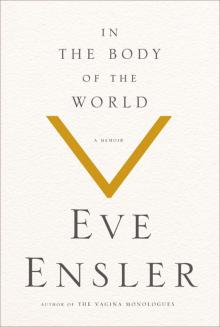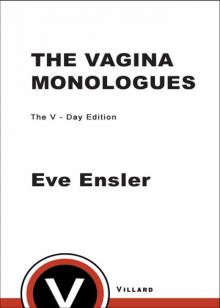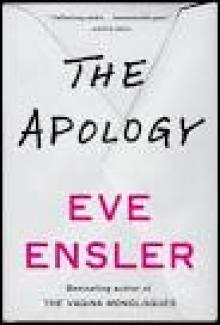- Home
- Eve Ensler
A Memory, a Monologue, a Rant, and a Prayer Page 12
A Memory, a Monologue, a Rant, and a Prayer Read online
Page 12
Sixth Avenue was very busy now, wall-to-wall people, like it used to be in the eighties, but this man held me in his arms for a very, very long time—telling me it was going to be all right. I kept telling him I wanted to go home and he asked where that was and I said I didn’t know and that it was nowhere—that I was hungry and tired and poor and that I was scared and that I had been that way for a while, that I was so light that I could float away or fall to the ground—what I couldn’t tell him was that I didn’t see a way out of any of it—that I had just traded in the barren landscape of my past for a more crowded, gray place and that I could not find comfort anywhere in this world. I could not stand up alone—my knees just kept buckling like a colt’s. So he waited and waited there with me until I could move. He hailed me a taxi; he gave the driver some money and told him to take me home. He told him to take good care of me.
About ten years later I was at a party. A woman I know grabbed my arm and with great enthusiasm, smiling, said, “I want you to meet my husband!” This man turned around. It was him. He saw me and I saw him and we stared at each other. She said, “Do you know each other?” And I said, “He helped me up once.” (Beat) “A long time ago.”
Conversation Between Heaven and Earth
Kathy Engel
five years since I fell over the earth
forced myself to look at your made-up face in a wood box
it wasn’t you
I delivered the eulogy
told how you rinsed the tomato sauce out of the spaghetti
for Naimah and Amandla
at Cummington when they were ten
you were trying to write as a mother does
Ajax in hand
Naimah has brought back your words to live forever the story of women in prison
where are you at some ungodly hour when I need an ear for these words
can’t go out there naked punctuation all crazy
you would say my clothes don’t match
it is all a breaking of bars a planting of words a faith unimaginable
my arms around Naimah but I was pale she stood taller than a young woman in your red dress taller than me her pale aunt shrinking at that moment my voice caught the way it did in childhood at a grave site
poems or beauty don’t bury
when Mbachi came from Zambia people thought
she was your daughter
this is relevant don’t cut this line
our survival is relevant
our stories from Edgecombe Avenue Zambia Buffalo and this Narrow Lane
are relevant
if I go to another meeting where men turn from naming every rape I will
I know nothing new
wake in terror
did I tell you Naimah is strong and open
like rivers of Egypt we never swam
but dreamed of
we have always
carried bags banners babies on hips backs bellies rinsed tomato sauce
have always cupped our hands like moons
to catch the wet crinkly utterance of life
crashing through dripping legs remember how you raced
to my baby shower late of course but with a basket of everything
I might need for the overflow we have always melted the metal part of burning into resistance
I can’t possibly think of a new or original thing to say
but I just turned fifty and you left us at fifty
honestly I know less
question more
remember when we wrote a poem together about where we live the black white beige and the food children Marvin Gaye
death penalties your black hands which are black
my beige hands living white
victorious in the holding
defying these cancers
except oh my if only you could see the girls now
you would sigh like the sun peeking through
the most glorious dawn because they are women and they know things
love to dance like we did speak Spanish
traverse continents they know something
poems roll like the sea in your red dress
both girls wrote to you their aunt
we try to teach our children living something true but contradictions
eat our insides like Snickers bars
Naimah has three kids
sits at the computer with your words
her words
you wrote everything sits on a minute
minutes fall like Fallujah
at least you didn’t have to see this
I recite the litany of brave women I practiced before birth following your verse but the names scale down my body like skin
when I say sister we earned that
didn’t name before earth tore open
to live
we who remain
suck poetry through veins
laugh volcanoes
laugh civil disobedience
pull onions from every sauce
drink
coffee in Gaza
grateful you didn’t have to see hot sauce jazz blues raped and they gave the storm a woman’s name
grateful you can’t hear the bombs again going down on ancient alphabets
like hard body parts into soft places
forced
your body left you
the cells testifying only against life finally who legislates
this is all I can write at this hour of my life
love poems love poems resistance to cancer resistance to war
resistance to stealing what we grow
resistance to leaving
resistance to hacking story like machetes
I know I need to talk about the place ghosts don’t want to go the naked place of responsibility
but all I can do is shake here in the middle of the night
in my drenching
dare the words
to come
drops of sweat and rain
orange light across our sky
I can’t recall my grandmother saying
the word woman but that’s what she gave me
my mother said woman told me never never let a person
with testicles lay a hand to you
come home to your mother you hear me that’s the only rule
we have to do more than pray for our daughters
it is the middle of the night of my life
my sister is making fewer movies and more self-defense martial arts
she has babies
and a body
I’m holding my breath saying the names of our girls
the way you would
in my pajamas at 3 a.m. no more nightgowns
in the zone as you called it
a moment on heaven still on this earth still eating tomatoes
seeds we spit out as girls
fruit we loved as women
breathing horse whiskers we can be girls we can be women we can be colors
we never imagined the prison doors just
blew open your poems did that
IN MEMORY: SAFIYA HENDERSON HOLMES
DECEMBER 30, 1950—APRIL 8, 2001
(with thanks to Alexis De Veaux)
Part Owner
Dr. Michael Eric Dyson
Her body was never really hers to begin with. Sure, she may have had it for the twenty-seven years she’s been on earth. But her body, like all black women’s bodies, never really belonged to her. Or maybe it never belonged just to her.
When she said she was raped by three white men, it became very clear that her body isn’t hers alone. It belongs to a history that hates black limbs and lusts for black flesh. It belongs to a politics that mutilates black souls and muffles black voices. It belongs to a nation that invaded black wombs for pleasure and profit.
Her body belongs to a nation that sold black bodies like cattle. It belongs to a court that said black folk had no rights that white folk were bo
und to respect. It belongs to a religion that said God saved African savages from their heathen homeland. It belongs to a region of citizens who went to war against their kin rather than give up the right to breed black bodies and keep them in bondage.
Her body belongs to every white man who wants it and who knows that a black woman can never be raped because she always “wants it.” After all, she is a willing prisoner of her carnal urges. Why would three white men ever have to take what a black woman has always been willing to give?
Her body already belonged to them because their grandfathers had willed it to them, just as her grandfather had done the dirty work so they could be clean and comfortable. One of their friends reminded her just in case she forgot. “Tell your grandfather thanks for the cotton shirt.”
She forgot that her body already belongs to them because the truth belongs to them. When a famous white man called her a ’ho on his radio show, he let her know that her body was his to play with and speak of as he liked. He could diminish her, even dismiss her, as he saw fit.
But her body also belongs to higher powers. It is on loan from the god who decided to give her life. At least that’s what she’s probably been told from the time she was a little girl. Back then theology made little sense except when there were stern reminders that “your body is a temple of the Holy Spirit.”
If her family didn’t tell her, the church did, even if she didn’t sit in its pews. The black church shows up whenever black folks say that God told them to love you, or help you, or instruct you, or uplift you. It also shows up when some of them tell you that you’re going to hell because you don’t believe the way they believe. Or because you behave the way they used to behave before Jesus saved them from the lake of fire.
It shows up when sisters who mean no harm tell you to watch how you prance and switch. After all, if your body sways the wrong way, it might even sway holy men to forget that your body belongs to God. Next thing you know, they’ll be borrowing his temple for a night and telling you that joy isn’t the only thing that comes in the morning.
Her body also belongs to every music video that pictures her as a hoochie, or trick, or gold digger, or chicken head, or skeezer, or hoodrat, or slut. Her body belongs to the slow-motion frames that capture her breasts jiggling, her hips gyrating, her behind protruding, and her torso writhing in sensual conniptions. She belongs to every lyric that tags her “bitch” or “ ’ho.”
She also belongs to every voyeur who pounds his flesh in the dark to splash on her ebony eroticism. She belongs to every fantasy of furious sex conjured by the pulsating rhythms of pelvic thrusts. She belongs to every would-be stud who peels off his roll of one-dollar bills to stuff into her moving G-string.
She belongs to every woman who, in order to feed her children and put herself through school, has to dance for a living—either by twirling around a pole in a club or spiraling up corporate stairs to a glass ceiling. She belongs to every woman who has had to hear that if she hadn’t been acting so sexy, she wouldn’t have been raped.
But she belongs, even more, to black women. She belongs to that little black girl who was molested by her uncle and then intimidated into silence. She belongs to that black girl with budding breasts who was seduced by a man claiming to be her “play father.” She belongs to that teenage black girl who was sexually abused by her mother’s boyfriend and then thrown out of the house when her mother desperately needed to believe her lover more than her daughter.
She belongs to the black girl who committed suicide with her mother when they discovered they were both sleeping with the same married minister. She belongs to the black girl who was murdered by her mother’s live-in companion because she might tell how he had taken her virginity when she was eleven. She belongs to the college student who was date-raped and hushed into shameful self-denial by repeating inside her brain all the reasons why she wasn’t really raped. She belongs to those other young women who have to escort men in order to usher kids into adulthood. She belongs to those young ladies who are reprimanded by their elders with harsh judgment. “If you hadn’t been acting like a loose woman in an immoral profession, you wouldn’t have been abused.”
If we never gain sight of her in all of this—never hear her voice or her story—she will only belong to myths and stories. She will only be a symbol, a cautionary tale. But she is more than that. She is a flesh-and-blood woman who may have been washed away from her truest identity by a wave of hurtful headlines and hateful speech. When she gets over that, and over all of us, she will finally, perhaps even triumphantly, belong to herself.
Woman Work
Maya Angelou
I’ve got the children to tend
The clothes to mend
The floor to mop
The food to shop
Then the chicken to fry
The baby to dry
I got company to feed
The garden to weed
I’ve got the shirts to press
The tots to dress
The cane to be cut
I gotta clean up this hut
Then see about the sick
And the cotton to pick.
Shine on me, sunshine
Rain on me, rain
Fall softly, dewdrops
And cool my brow again.
Storm, blow me from here
With your fiercest wind
Let me float across the sky
Till I can rest again.
Fall gently, snowflakes
Cover me with white
Cold icy kisses and
Let me rest tonight
Sun, rain, curving sky
Mountain, oceans, leaf, and stone
Star shine, moon glow
You’re all that I can call my own.
I’ve got to open the shop
Harvest the crop
Clean out the pool
Visit the jail
Get to the school
Teach all the classes
Pick up the mail
Raise food for the masses
I’ve got children to tend
The clothes to mend
I got to
I got to
I got to
Eye to Eye
Deena Metzger
In the dream, she can hear the moonlight fall, illuminating the black car that would have crawled silently as a shadow to her house perched at the end of a road where the last of the wild meets the encroachment of men. Or the vehicle, black as such vehicles are, and the windows dark to hide the occupants, is itself the instrument that slits apart the clouds to expose the light.
In the dream, she is awakened by silence rolling to her door and a man exiting the car soundlessly, as if he has learned from the animals how to walk, but he hasn’t; he has learned only about boots and how to tread with them so nothing is signaled by his step. But the woman is awakened nevertheless because she knows the animal and this is no animal stalking. There is no kindness in the man and his approach, and so the woman waits for the door to open, the way ten or hundreds or thousands of women are waiting just then, somewhere, for such a door to open, a door she has a right to expect to remain closed, though it isn’t locked because she hates splintered wood and shards of broken glass.
Everywhere women and girls, even young boys, are waiting for such an intrusion that can be described as bitter moonlight shining on a bayonet seeking the dark. A world, an entire globe, anguished by such a plague of waiting that until recently has never been afflicted so. The consequence of war, perhaps the very first world war, in interminable explosion.
Now, alert, she sits up and waits, the way a leopard unwinds itself from the tree branch that it embraces in its sleep, watchful for the first tremulous movement of air at the outskirts, and the first revelation of what is coming to the creature that can see in the dark.
She knows she will see before he will see, and this is not what he expects. She also knows he is blind, and he doesn’t know he is blind. And so, having no weapons,
and not wanting weapons, she will let him choose how he will have her, dead or alive. This choice will determine everything. And this, also, he doesn’t understand.
In the dream, she speaks after he enters and makes his demands but also as if he has not forced his way, postured or blustered or puffed up like an adder. In the dream, she puts out her arms and raises her knees so the white nightdress falls between them like snow. In the dream, she does not allow him to kill her. In the dream, she draws him into her body with a tide he cannot resist.
In the dream, she takes him into her body—the young boy who has never been stroked, or who is tormented until he converts pain to pleasure, or who has not awakened from the nightmare in which, in order to live, he is forced to kill his sister and, in order to eat, to be a soldier for life.
In the dream, she takes him into her body—the mother who has watched this agony all her life. In the dream, she makes a demand that he cannot deny her. In the dream, he must look at her. In the dream, his eyes are open and locked into hers. In the dream, she does not blink, she does not falter. She does not lower her gaze.
In the dream, she cannot resist any more than the dry earth can refuse water, or the dark can refuse light, or the grave can resist the body that falls. In the dream, she decides to love him and to look him in the eyes. In the dream, he cannot look away.
In the dream, the rain falls on the bed, and embers of starlight burn onto the floor while the trees that were axed resurrect themselves from the stumps that remained, and the great cats roar again from their forest perch, and everything massacred rises up into life again.
Or it does not.
In the dream of a woman who had been raped twice—at knifepoint and at gunpoint—she takes the killer into her body and makes him look her in the eye. In the dream, she says, “You will have to claw your way to forgiveness.” It is not the man’s dream, and so we do not know if he understands. And then we do not know if the woman continues dreaming, or awakens, is awake, or if she dies.

 In the Body of the World
In the Body of the World A Memory, a Monologue, a Rant, and a Prayer
A Memory, a Monologue, a Rant, and a Prayer The Vagina Monologues
The Vagina Monologues The Apology
The Apology